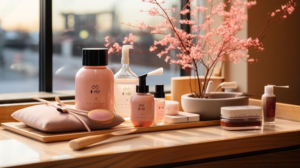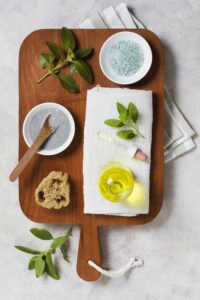Oily skin is a common skin type characterized by an overproduction of sebum, the natural oil produced by the skin’s sebaceous glands. This excess oil can lead to a shiny complexion, enlarged pores, and an increased susceptibility to acne and other skin issues. People with oily skin often find themselves dealing with the frustration of frequent breakouts and a constant need to manage shine throughout the day. However, it’s important to note that oily skin has advantages. The excess oil can help maintain hydration and protect the skin from external aggressors.
Understanding the factors that contribute to oily skin can help individuals better manage and care for their skin. Genetics plays a significant role, as oily skin tends to run in families. Hormonal changes, such as during puberty, pregnancy, or menstruation, can also influence sebum production. Additionally, environmental factors like humidity and certain skincare products can impact oiliness.
Proper skincare is essential for managing oily skin. This includes cleansing the skin regularly with a gentle cleanser to remove excess oil, dirt, and impurities without stripping away too much moisture. Using oil-free or non-comedogenic moisturizers and sunscreen can help hydrate the skin without clogging pores. Incorporating exfoliation into a skincare routine can also be beneficial for oily skin. This helps remove dead skin cells and prevent pore blockages that can lead to breakouts. However, it’s important not to over-exfoliate, as this can irritate the skin and exacerbate oiliness.
Finding the right balance of skin care products and techniques is key to managing oily skin effectively. Consulting with a dermatologist can provide personalized recommendations and guidance for addressing specific concerns related to oily skin. By understanding the unique characteristics of oily skin and implementing appropriate skincare practices, individuals can maintain a balanced complexion and minimize the challenges associated with excess oil production.
Table of Contents
Understanding Oily Skin: Causes and Characteristics
There are a few things that can cause oily skin, like your genes, hormone levels, and the stuff around you. Let’s take a closer look at how these things play a role.
Genetics:
- Oily skin can be hereditary, meaning it tends to run in families. Individuals with parents or siblings who have oily skin are more likely to experience it themselves.
- Genetics play a role in determining the size and activity of the sebaceous glands, which produce sebum, the skin’s natural oil. Overactive sebaceous glands can lead to an excess of oil on the skin’s surface.
Hormonal Changes:
- Hormonal fluctuations can significantly impact sebum production and, consequently, oily skin. During puberty, for example, hormonal changes trigger an increase in sebum production, leading to oily skin and often acne.
- Hormonal shifts during other life stages, such as pregnancy, menstruation, or menopause, can also affect sebum production and contribute to oily skin. These hormonal changes may lead to temporary or persistent oiliness.
Environmental Factors:
- Environmental conditions can influence oily skin by affecting sebum production and skin hydration levels.
- Humidity is a key environmental factor that can exacerbate oily skin. High humidity levels can stimulate the sebaceous glands to produce more oil, leading to a shinier complexion.
- Exposure to certain pollutants, such as airborne particles and toxins, can also contribute to oily skin by clogging pores and increasing sebum production.
- Additionally, using harsh or inappropriate skincare products, exposure to UV radiation, and living in polluted areas can all impact the skin’s oiliness.
Understanding these causes and characteristics of oily skin is essential for developing an effective skincare routine and managing oiliness effectively. By addressing genetic predispositions, hormonal fluctuations, and environmental influences, individuals can better care for their oily skin and maintain a healthy, balanced complexion.
The Importance of a Skincare Routine for Oily Skin
Maintaining a consistent skincare routine is crucial for individuals with oily skin to manage excess oil production, prevent acne and breakouts, and promote overall skin health. Here’s why a dedicated skincare regimen is essential:
Control of Excess Oil Production:
Your skin tends to produce a lot of natural oils, which can make it look shiny and cause blocked pores if you don’t take good care of it.
- A targeted skincare routine helps regulate sebum production by removing excess oil and balancing the skin’s pH levels. Using oil-free or mattifying cleansers and moisturizers helps control shine without stripping the skin of essential moisture.
Prevention of Acne and Breakouts:
- Excess oil on the skin’s surface can trap dead skin cells and bacteria, leading to the formation of acne and breakouts. Regular cleansing and exfoliation help unclog pores and prevent the buildup of impurities.
- Incorporating products with ingredients like salicylic acid or benzoyl peroxide can further aid in controlling acne and reducing inflammation associated with breakouts.
Maintenance of Skin Health:
- Consistent skin care practices contribute to the overall health and well-being of the skin, regardless of skin type.
- Proper cleansing removes dirt, makeup, and environmental pollutants that can accumulate on the skin throughout the day, preventing potential irritation and damage.
- Hydrating the skin with lightweight, non-comedogenic moisturizers helps maintain its natural barrier function and prevents dehydration, which can exacerbate oiliness and lead to skin issues.
Establishing a skincare routine tailored to oily skin ensures that the skin remains balanced, clear, and healthy. By controlling excess oil production, preventing acne and breakouts, and prioritizing skin health, individuals with oily skin can achieve a more radiant and confident complexion. Regularity and adherence to a personalized skincare regimen are key to seeing long-term improvements in oily skin concerns.
Building an Effective Oily Skincare Routine

Creating a skincare routine tailored to oily skin involves selecting the right products and techniques to address specific concerns while maintaining balance and hydration. Here’s how to build an effective oily skincare routine:
Cleansing:
- Start your routine with a gentle yet effective cleanser designed for oily or acne-prone skin. Look for formulas that are oil-free and non-comedogenic to avoid clogging pores.
Give your face a good cleaning twice a day – once in the morning and once at night – to get rid of any extra oil, dirt, and gunk without drying out your skin.
- Consider using a foaming or gel-based cleanser with ingredients like salicylic acid or tea tree oil to help control oil production and prevent breakouts.
Toning:
- Incorporate a toner into your routine to further cleanse the skin and remove any remaining traces of impurities. Look for alcohol-free toners formulated for oily skin to avoid over-drying.
- Toners can help balance the skin’s pH levels and tighten pores, creating a smoother and more refined complexion.
Gently apply the toner using a cotton pad or your fingertips, then let it soak in before moving on to the next part.
Moisturizing:
Even though you have oily skin, it’s still important to moisturize to keep your skin hydrated and healthy. Go for lightweight, non-greasy moisturizers that won’t make your skin feel weighed down or slick.
- Look for moisturizers labeled as non-comedogenic to avoid exacerbating oiliness or clogging pores. Ingredients like hyaluronic acid and glycerin can help hydrate the skin without adding extra oil.
Put on the moisturizer nice and even all over your face and neck, making sure to hit those spots that tend to get a little dry or tight. Let it soak in real good before adding anything else on top.
Sunscreen:
It’s super important to shield your skin from the sun’s damaging UV rays, even if your skin is on the oily side. Go for a sunscreen that covers a wide range of the spectrum, with an SPF of 30 or more, and make sure it’s oil-free and won’t clog up your pores.
- Apply sunscreen generously to all exposed areas of the skin, including the face, neck, and any other areas prone to oiliness or breakouts.
- Reapply sunscreen every two hours, especially if you’re spending extended periods outdoors or engaging in activities that cause sweating or swimming.
By following this comprehensive skincare routine, individuals with oily skin can effectively manage excess oil production, prevent breakouts, and maintain a healthy, balanced complexion. Consistency and using suitable products tailored to oily skin are key to achieving optimal results. Also to have a deep insight into how to layer your skincare products, visit this blog on “Secrets to Layer Skincare Products in Correct Order:102”
Key Ingredients for Oily Skin

When selecting skincare products for oily skin, it’s essential to look for ingredients that effectively control excess oil production, unclog pores, and maintain skin hydration without causing irritation. Here are some key ingredients known for their beneficial effects on oily skin:
Salicylic Acid:
Salicylic acid is a special ingredient that gets deep into your pores to clear the gunk, like extra oil and dead skin. It also calms things down when you get those annoying breakouts, helping to reduce any redness or swelling.
- Salicylic acid is effective in preventing and treating acne, blackheads, and whiteheads by keeping pores clear and preventing them from becoming clogged.
Benzoyl Peroxide:
- Benzoyl peroxide is a powerful antibacterial agent that kills acne-causing bacteria on the skin’s surface.
- It works by reducing inflammation and eliminating excess oil, making it an effective treatment for acne and preventing breakouts.
- Benzoyl peroxide is available in various concentrations and formulations, including cleansers, spot treatments, and leave-on creams or gels.
Hyaluronic Acid:
- Hyaluronic acid is a humectant that attracts and retains moisture in the skin, keeping it hydrated without adding extra oil.
- Despite its name, hyaluronic acid is suitable for oily skin because it provides lightweight hydration and helps balance the skin’s moisture levels.
- It plumps and smooths the skin’s surface, reducing the appearance of fine lines and wrinkles without clogging pores or feeling greasy.
Niacinamide:
- Niacinamide, also known as vitamin B3, offers multiple benefits for oily skin, including regulating sebum production and minimizing pore size.
- It has anti-inflammatory properties that help calm redness and irritation associated with acne and other skin conditions.
- Niacinamide also enhances the skin’s barrier function, improving its resilience and protecting against environmental stressors.
Incorporating skincare products containing these key ingredients can help individuals with oily skin effectively manage oiliness, prevent acne breakouts, and maintain a healthy complexion. It’s important to introduce new products gradually and patch-test them first to ensure compatibility with your skin type and minimize the risk of irritation. Additionally, consulting with a dermatologist can provide personalized recommendations for addressing specific oily skin concerns.
Morning Skincare Routine for Oily Skin
Combatting excess oil and maintaining a balanced complexion is key for those with oily skin. Start your day off right with this extensive morning skincare routine designed to cleanse, hydrate, and protect your skin while keeping shine at bay.
Cleansing with a Gentle Foaming Cleanser:
- Start your morning skincare routine by cleansing your face with a gentle foaming cleanser specifically formulated for oily skin.
- Choose a cleanser that effectively removes excess oil, dirt, and impurities without stripping the skin of its natural moisture.
- Gently massage the cleanser onto damp skin using circular motions, then rinse thoroughly with lukewarm water and pat dry with a clean towel.
Applying a Lightweight, Oil-Free Moisturizer:
- After cleansing, apply a lightweight, oil-free moisturizer to hydrate and nourish the skin without adding extra shine.
- Look for moisturizers that are non-comedogenic and designed for oily or acne-prone skin, containing ingredients like hyaluronic acid or glycerin.
- Apply a small amount of moisturizer evenly onto your face and neck, avoiding heavy application on oily areas.
Using a Broad-Spectrum Sunscreen:
- Sunscreen is a crucial step in any skincare routine, especially for oily skin, as it helps protect the skin from harmful UV rays and prevents premature aging.
- Choose a broad-spectrum sunscreen with an SPF of 30 or higher and a lightweight, non-greasy formulation.
Be sure to lather up that sunscreen real good on any body parts that are out in the open, like your face, neck, and anywhere else your skin is showing.
- Reapply sunscreen throughout the day, especially if spending extended periods outdoors or engaging in activities that cause sweating.
By following this morning skincare routine tailored to oily skin, you can effectively cleanse, hydrate, and protect your skin without exacerbating oiliness or causing breakouts. Consistency is key to seeing long-term improvements in oil control and maintaining a healthy complexion.
Evening Skincare Routine for Oily Skin
As the day comes to a close, it’s important to give your oily skin the attention it needs to cleanse away impurities, control excess oil, and promote skin renewal overnight. Follow this comprehensive evening skincare routine to achieve a clearer, more balanced complexion.
Double Cleansing to Remove Makeup and Impurities:
- Begin your evening skincare routine with a double cleansing method to thoroughly remove makeup, sunscreen, and impurities accumulated throughout the day.
Start by using an oil-based cleanser – it’ll help dissolve and wash away all that oil-based stuff like makeup and sunscreen. Rub the oil cleanser right onto your dry skin, then rinse it all off with some lukewarm water.
- Follow up with a water-based or foaming cleanser to cleanse the skin’s surface and remove any remaining residue. Massage the cleanser onto damp skin, then rinse thoroughly and pat dry.
Exfoliating with a Gentle Chemical Exfoliant:
- 2-3 times a week, incorporate a gentle chemical exfoliant into your evening routine to help remove dead skin cells, unclog pores, and improve skin texture.
- Choose a chemical exfoliant containing ingredients like salicylic acid or glycolic acid, which effectively penetrate the pores and promote cell turnover.
- Apply the exfoliant to clean, dry skin, focusing on areas prone to congestion or excess oil, such as the T-zone. Allow the exfoliant to sit for the recommended time before rinsing off with water.
Applying a Targeted Treatment for Acne or Congestion:
- After exfoliating, apply a targeted treatment specifically formulated to address acne or congestion.
- Look for treatments containing ingredients like benzoyl peroxide, salicylic acid, or sulfur, which help reduce inflammation, unclog pores, and eliminate acne-causing bacteria.
- Apply the treatment sparingly to affected areas, avoiding healthy skin, and allow it to absorb fully before proceeding to the next step.
Hydrating with a Non-Comedogenic Moisturizer:
- Finish your evening skincare routine by hydrating the skin with a non-comedogenic moisturizer.
- Choose a lightweight moisturizer that won’t clog pores or exacerbate oiliness, containing ingredients like hyaluronic acid or ceramides to lock in moisture.
- Apply a small amount of moisturizer evenly onto your face and neck, focusing on areas that feel dry or tight, while avoiding heavy application on oily areas.
By following this evening skincare routine tailored to oily skin, you can effectively remove makeup and impurities, exfoliate to unclog pores, target acne or congestion, and hydrate the skin without causing further oiliness or irritation. Consistency and using products suitable for oily skin are key to achieving optimal results and maintaining a healthy complexion.
Weekly Treatments for Oily Skin
In addition to daily skincare routines, incorporating weekly treatments can further help manage excess oil production, minimize pores, and prevent breakouts for oily skin. Here are some effective weekly treatments:
Clay Masks:
- Clay masks are excellent for oily skin as they help absorb excess oil, unclog pores, and remove impurities from the skin’s surface.
- Choose a clay mask formulated with ingredients like kaolin, bentonite, or French green clay, known for its oil-absorbing and purifying properties.
- Apply a thin layer of the clay mask to clean, dry skin, avoiding the delicate eye area. Allow the mask to dry completely, typically for 10-15 minutes, then rinse off with lukewarm water. Use 1-2 times a week for best results.
Oil-Absorbing Sheets:
- Oil-absorbing sheets, also known as blotting papers, are convenient for on-the-go oil control throughout the week.
- Keep a pack of oil-absorbing sheets handy in your purse or bag to quickly absorb excess oil and shine from the skin’s surface.
- Gently press the blotting paper onto oily areas of the face, focusing on the forehead, nose, and chin. Hold the sheet in place for a few seconds to allow it to absorb oil, then discard. Use as needed throughout the day to mattify the skin without disturbing makeup.
Spot Treatments for Blemishes:
- Spot treatments are targeted solutions designed to address individual blemishes, pimples, or acne spots.
- Choose spot treatments containing ingredients like benzoyl peroxide, salicylic acid, or tea tree oil, known for their antibacterial and anti-inflammatory properties.
- Apply a small amount of spot treatment directly onto blemishes before bed or as needed during the week. Allow the treatment to absorb fully before applying other skincare products.
Incorporating these weekly treatments into your skincare routine can help control oiliness, minimize pores, and keep breakouts at bay for oily skin. Consistency is key to seeing the best results, so be sure to follow a regular schedule and adjust treatment frequency based on your skin’s needs.
Diet and Lifestyle Tips to Deal With Oily Skin

In addition to a proper skincare routine, certain diet and lifestyle habits can play a significant role in managing oily skin. Here are some tips to help you maintain a healthy complexion:
Hydration:
It’s important to stay hydrated by sipping on water throughout the day. Keeping your body well-hydrated helps flush out any unwanted stuff and makes your skin feel refreshed from the inside out.
Aim for at least 8-10 cups of water per day, or more if you’re extra active or living in a warm climate.
- Limit intake of sugary and caffeinated beverages, as they can contribute to dehydration and potentially exacerbate oily skin.
Balanced Diet:
Eating a healthy, well-rounded mix of fruits, veggies, whole grains, and lean meats can do wonders for your skin. Those nutrient-packed foods give your body the vitamins and minerals it needs to look and feel its best.
Try adding some antioxidant-rich foods like berries, leafy greens, and other veggies to your diet – they can help keep your skin looking and feeling its best by fighting off stress and inflammation.
- Limit consumption of greasy, fried, and processed foods, as they can contribute to excess oil production and acne breakouts.
Stress Management:
- Practice stress management techniques to help reduce cortisol levels and minimize stress-related skin issues.
- Engage in relaxation activities such as yoga, meditation, deep breathing exercises, or spending time in nature to promote a sense of calm and well-being.
Getting enough high-quality sleep, like 7-8 hours a night, is crucial. When you’re well-rested, your skin can better heal and renew itself, which helps keep oil levels in check.
Skincare Products and Makeup:
- Choose skincare products and makeup labeled as non-comedogenic or oil-free to avoid clogging pores and exacerbating oiliness.
- Cleanse your face thoroughly every night to remove makeup, dirt, and excess oil that can accumulate throughout the day.
- Avoid over-exfoliating or using harsh products, as this can strip the skin of its natural oils and lead to rebound oil production.
By incorporating these diet and lifestyle tips into your daily routine, you can effectively manage oily skin and promote a healthy, balanced complexion. Consistency and patience are key, as it may take time to see improvements, but adopting these habits can lead to long-term benefits for your skin health.
Common Mistakes to Avoid
When caring for oily skin, it’s crucial to sidestep common missteps that can amplify oiliness, deplete the skin’s natural hydration, and trigger additional skin problems. It’s essential to steer clear of these key pitfalls.
Overwashing the Face:
- Washing your face too frequently or using harsh cleansers can strip the skin of its natural oils, leading to rebound oil production and potential irritation.
Wash your face gently no more than twice a day, once in the morning and once in the evening, using a mild cleanser designed for oily skin types. Overzealous scrubbing can exacerbate skin irritation and greasiness, so it’s best to exercise caution.
Skipping Moisturizer:
- Many people with oily skin mistakenly believe that moisturizers will make their skin even oilier. However, skipping moisturizer can actually signal the skin to produce more oil to compensate for the lack of hydration.
- Choose a lightweight, oil-free moisturizer specifically designed for oily skin. Look for non-comedogenic formulas that won’t clog pores or feel greasy on the skin.
- Apply moisturizer after cleansing to help maintain the skin’s natural barrier function and prevent dehydration.
Using Harsh Products:
- Using skincare products that are too harsh or abrasive can disrupt the skin’s natural balance, leading to irritation, inflammation, and increased oiliness.
- Avoid products containing alcohol, fragrances, and other harsh ingredients that can strip the skin and cause dryness or irritation.
- Opt for gentle, non-irritating products formulated for oily or acne-prone skin. Look for ingredients like salicylic acid, benzoyl peroxide, or niacinamide that target oiliness and acne without causing undue irritation.
By avoiding these common mistakes and adopting a balanced approach to skincare, you can effectively manage oily skin and maintain a healthy, radiant complexion. Consistency, patience, and using products suited to your skin’s needs are key to achieving optimal results. If you’re unsure about which products or techniques are best for your skin, consult with a dermatologist for personalized recommendations.
Adapting the Skincare Routine According to the Season
Adjusting your skincare regimen in sync with the shifting environmental conditions can help your skin flourish year-round. By tailoring your routine to address seasonal factors, you can maintain a healthy, balanced complexion throughout the changing seasons.
Summer:
- During the summer months, the heat and humidity can lead to increased oil production and the potential for breakouts. Switch to lighter, oil-free products to help control shine and prevent clogged pores.
Applying a lightweight, non-greasy sunscreen with robust SPF protection is crucial to safeguarding your skin from the detrimental effects of UV radiation. Ensure to reapply the sunscreen diligently, especially during prolonged periods spent outdoors.
- Consider using a mattifying primer or setting spray to help control oil and keep your makeup in place in hot and humid weather.
Fall:
- In the fall, cooler temperatures and lower humidity levels can lead to drier skin. Switch to a richer, more hydrating moisturizer to help combat dryness and maintain skin moisture.
- Consider adding a facial oil or hydrating serum to your routine to provide an extra layer of hydration and nourishment for your skin.
- Exfoliate regularly to remove dead skin cells and promote cell turnover, helping to reveal smoother, more radiant skin as the weather transitions.
Winter:
The harsh, drying conditions of winter can leave skin feeling parched, scaly, and inflamed. By switching to a gentle, moisturizing cleanser, you can help prevent your skin from being stripped of its essential oils.
- Use a thicker, more emollient moisturizer to provide extra hydration and protect the skin from harsh winter weather. Look for ingredients like hyaluronic acid, glycerin, and ceramides to help repair and strengthen the skin barrier.
- Consider incorporating a weekly hydrating mask or overnight sleeping mask to provide intense hydration and nourishment for your skin.
Spring:
- As the weather begins to warm up in spring, it’s essential to adjust your skincare routine to address any lingering dryness from the winter months while preparing for increased oil production as temperatures rise.
For a more comfortable complexion during warmer months, consider transitioning to a lightweight moisturizer or gel-based formula. Maintaining daily sunscreen application is crucial to safeguarding your skin from harmful UV exposure.
- Consider incorporating products with antioxidant-rich ingredients like vitamin C or green tea extract to help protect your skin from environmental stressors and promote a healthy, radiant complexion.
By adapting your skincare routine according to the season, you can effectively address seasonal changes and maintain healthy, balanced skin throughout the year. Pay attention to how your skin responds to different environmental conditions and adjust your routine as needed to keep your skin looking and feeling its best.
Caring for oily skin requires a tailored approach that addresses specific concerns such as excess oil production, acne, and maintaining skin health. By understanding the causes and characteristics of oily skin, individuals can develop effective skincare routines that control oiliness, prevent breakouts, and promote overall skin balance.
Key components of a successful skincare routine for oily skin include gentle cleansing, hydration with non-comedogenic moisturizers, and regular use of sunscreen to protect against UV damage. Additionally, incorporating targeted treatments such as salicylic acid or benzoyl peroxide can help address acne and congestion.
It’s important to avoid common mistakes like overwashing the face, skipping moisturizer, and using harsh products, as these can exacerbate oiliness and lead to other skin issues. Instead, focus on consistency, patience, and using products suited to your skin’s needs to achieve optimal results.
Adapting your skincare routine according to the season is also crucial for addressing seasonal changes in environmental factors and maintaining skin health year-round. By following these guidelines and making adjustments as needed, individuals with oily skin can achieve a healthy, balanced complexion and feel confident in their skincare routine.




